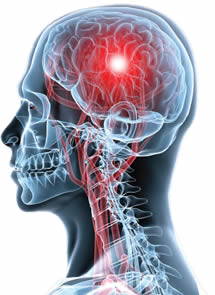Our brain controls virtually every function of our bodies. After a brain injury, many parts of the brain will work just as well as they always did, and other parts will not. The damage can vary from very mild to very severe. The result is that brain function can be somewhat patchy and inconsistent. No two people will have the same injury, although there are many effects that are typical among survivors.
So, what does a brain injury “look” like?
Brain Injury can be very difficult to identify simply by looking at a person. It is often called the “invisible injury” because most of the problems involve thinking and emotions. Family members, friends and professionals may not “see” your brain injury at all, which can lead to a lot of frustration for everyone.

What does a brain injury “feel” like?
Survivors of brain injury say it feels like:
Living in a cloud.
Getting really drunk.
Being hung-over 24/7.
Being in a hot tub way too long.
Waking up from fainting.
Looking inside your head & seeing mushroom soup.
Floating around weightless in a total black abyss with no gravity. Can’t tell what is up, down or sideways. Can’t get a handhold on anything.
Trying to read multiple posters in a dark room with a narrow beam flashlight. As soon as you move the beam to a new spot, the first spot you looked at disappears.
Physical Effects – This includes physical changes in body functions
 ♦ Energy crashes – gets tired very easily, needs long naps to recover
♦ Energy crashes – gets tired very easily, needs long naps to recover
♦ Sleep problems – can’t get to sleep, wakes up frequently, can’t wake up
♦ Headaches – very intense, sharp, burning or jolting
♦ Chronic pain – ongoing pain in body
♦ Ringing in the ears – also known as tinnitus, often sounds like crickets
♦ Changes in senses – sight, smell, taste and hearing
♦ Changes in appetite – doesn’t feel hunger, or never feels full after eating
♦ Altered body temperature – doesn’t feel heat or cold, body temperature fluctuates
♦ Difficulty swallowing – coughs or chokes when eating or drinking
♦ Changes in speech – stutters, mixes words up
♦ Balance/co-ordination – loses balance, falls down, staggers when walking
♦ Paralysis/weakness – has noticably less strength in arms or legs
♦ Numbness/tingling – feels like limb’s falling asleep
♦ Muscle spasms – shaking, stiff or jerking muscles
♦ Seizures – convulsions
Cognitive Effects – This includes changes in thinking abilities
♦ Difficulty focusing – mind seems to wander, easily distracted
♦ Memory problems – forget things short term, and/or spotty long term memories◊
♦ Slowed thinking – world feels too fast, can’t keep up
♦ Flooding – brain gets overwhelmed and shuts down
♦ Trouble understanding – takes longer to learn
♦ Learning from experience – keeps doing the same things over and over
♦ Perseveration – excessive fixation on some thoughts, trouble letting go
♦ Rigid thinking – things are only “black & white”, there is no in-between
♦ Difficulty with executive functions such as:
o Sequencing – has trouble knowing what order to do things in
o Organizing – is easily mixed up, misses things,
o Planning – has trouble figuring out how to meet goals
o Reasoning – has trouble understanding what is appropriate
o Decision Making – has trouble looking at pro’s and con’s of matters
o Problem solving – has trouble looking at options in order to find good solutions
o Serial-tasking – Has trouble trying to do more than one task at a time

Psychosocial Effects – changes in emotions and social behaviour
♦ Reduced self-awareness – not able to see themself or their problems honestly
♦ Increased self-focus – see only their own needs, finds it hard to see others’ point of view
♦ Emotional fluctuations – emotions are very intense, change rapidly, do not fit
♦ Depression – grieving over what is lost, sad, suicidal
♦ Anxiety and/or stress – feel stressed, jittery, restless, frightened
♦ Impatience and anger – has a quick temper, sometimes very threatening
♦ Impulsivity – acts without thinking first, with no thought to consequences
♦ Difficulty coping with change – can either be spur of the moment, or routine change
♦ Lower motivation and follow through – trouble getting started and finishing
♦ Changes in social skills – difficulties following socially acceptable behaviors
♦ Misperceptions – misunderstands people and things
♦ Changed sexual interest – has either decreased or increased interest
♦ Relationship problems – difficulty with family, friends and spouse
♦ Use of alcohol/ drugs – self-medication to cope with daily problems
♦ Reduced ability to work – cannot keep pace, cannot return to old job
♦ Changes in self-identity – changes in personality, does not know how to define self
The good news is that many of these challenges are easily dealt with using compensatory, or coping, strategies.

